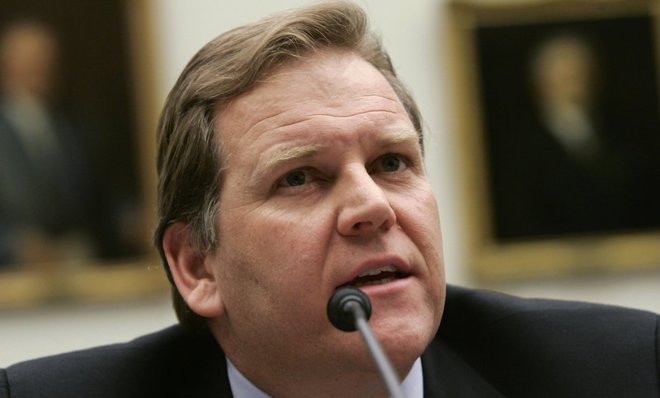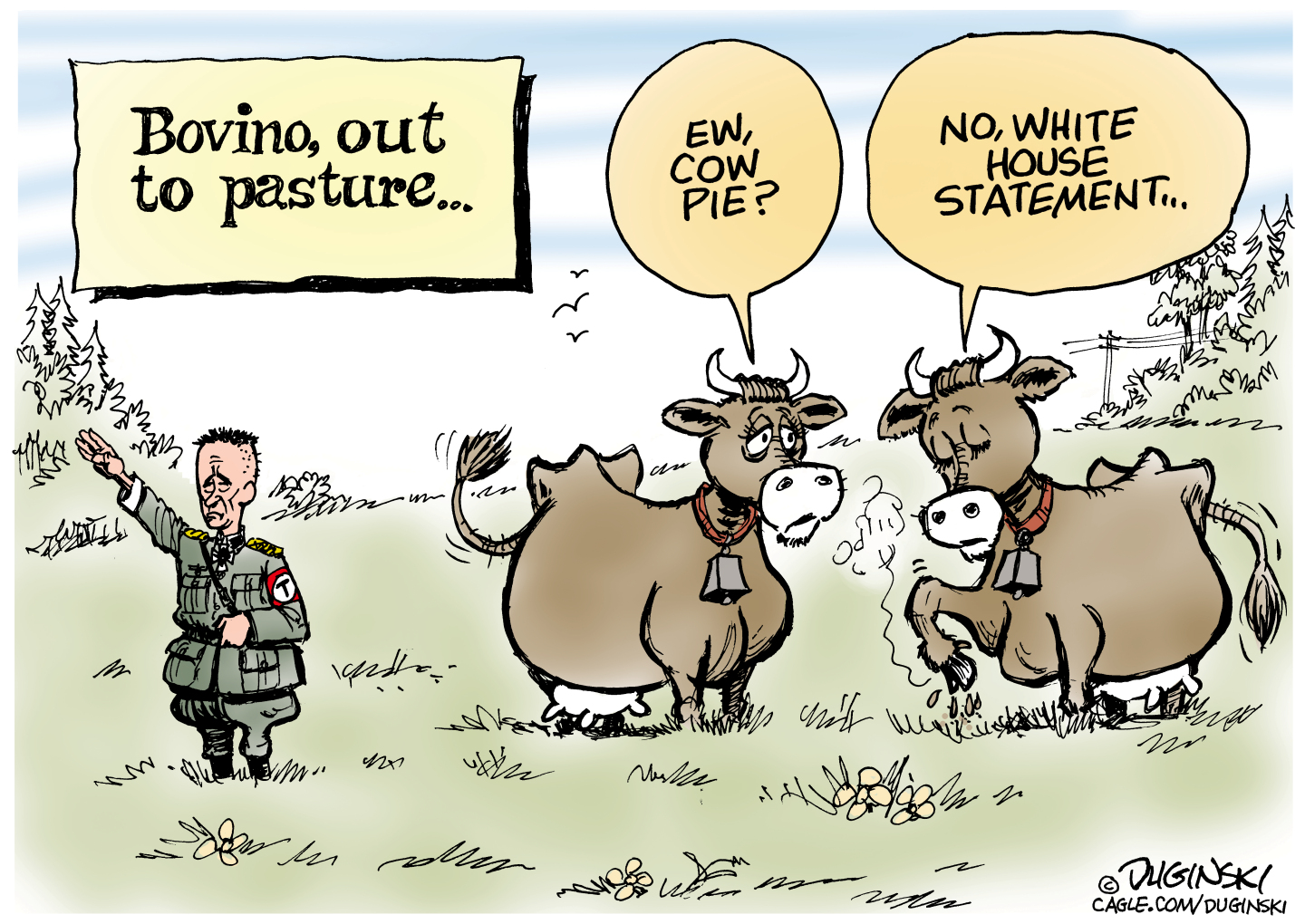The Republican who should write Obama's speeches
Rep. Michael Rogers has a better grasp of the president's policy than the president


Finally, an honest answer from the U.S. government about the likelihood of Americans ever fighting on the ground in Iraq against ISIS:
We're going to defeat ISIS. That's what we're going to do. We're going to do it together. We're going to bring in coalition forces. We don't think it's going to need big units, like the 101st Airborne Division, the 1st MEF, we don't believe that, but it may require our special capabilities, soldiers, and intelligence officials, going downrange, if you will, to make sure that we are effective in what we're going to do.
Kudos to the presidential speechwriter for injecting some clarity and perspective.
Oh? No... That did not come out of the president's mouth?
The Week
Escape your echo chamber. Get the facts behind the news, plus analysis from multiple perspectives.

Sign up for The Week's Free Newsletters
From our morning news briefing to a weekly Good News Newsletter, get the best of The Week delivered directly to your inbox.
From our morning news briefing to a weekly Good News Newsletter, get the best of The Week delivered directly to your inbox.
Mike Rogers said that? The Republican representative from Michigan? The chairman of the House Permanent Select Committee on Intelligence?
The White House might want to send him to the speechwriting department for a bit. He's able to explain what the president intends to do more clearly than the president can himself.
Speaking at the home base of the U.S. Central Command in Tampa Wednesday, President Obama insisted that he "will not commit you, and the rest of our armed forces, to fighting another ground war in Iraq."
USA Today understood this to mean the president was "doubling down" on his promise to avoid deploying any "ground combat troops in Iraq."
A free daily email with the biggest news stories of the day – and the best features from TheWeek.com
The newspaper's interpretation is wrong. But I think the fault lies entirely with the president, whose advisers have used Sherman-esque constructions like "rule out" to describe his thinking on whether he'd send U.S. troops to the front lines of the conflict with ISIS.
I think the fault lies with a White House that is desperate to distinguish the president's counterterrorism campaign against ISIS from President Bush's invasion of a sovereign country in 2003.
The White House believes that American war fatigue will infect Democrats and that if the public in any way finds the counterterrorism campaign today similar to the Bush war of yesterday, then Democrats will lose the Senate and many more House seats.
And the White House has concluded that because Americans equate "ground troops" with the Iraq War and "airpower" with drones and counterterrorism, Obama should not even obliquely refer to the first set of conditions.
What the White House wants to say, really, is this: "This thing here with ISIS won't be like Iraq, really."
What it's saying: "There will be no ground troops sent to Iraq. That decision has been made."
It's that second statement that everyone from Robert Gates, the president's former secretary of defense, to Martin Dempsey, the president's current chairman of the Joint Chiefs of Staff, to the head of CENTCOM, Gen. Lloyd J. Austin, finds nonsensical.
They find it questionable because they know — and they do know this — that the president's plan for combating ISIS must include some ground component. They know this because it already does. Even the White House acknowledges that certain of its "trainers" might be sent to the front lines — or "forward deployed," in military-technocratic parlance. What will they do there? Just watch? Hardly. They will fight. There might be Iraqis with them, but they're going to fire weapons if they're in danger or tasked to solve a problem.
Many of these "trainers" are combat-ready special forces from the U.S. Army. A smaller number consists, almost certainly, of a Joint Special Operations Command task force that, again, almost certainly, includes operational detachments. About 1,600 U.S. forces, along with several hundred intelligence enablers from the CIA and elsewhere, will be somewhere in Iraq by the end of the month. That's a tiny number compared with the Iraq War. It is a significant deployment for a complex counterterrorism campaign.
For Obama, it's as if any talk of "ground troops" is essentially equivalent to the existential disaster of Iraq. Wednesday he said that "[a]fter a decade of massive ground deployments, it is more effective to use our unique capabilities in support of partners on the ground so they can secure their own countries' futures. We'll use our airpower ... We will train and equip our partners."
Most everyone, aside from John McCain and Lindsey Graham, agrees with that.
But the president's policy is undercut by an overpromise.
That does no one any good.
Marc Ambinder is TheWeek.com's editor-at-large. He is the author, with D.B. Grady, of The Command and Deep State: Inside the Government Secrecy Industry. Marc is also a contributing editor for The Atlantic and GQ. Formerly, he served as White House correspondent for National Journal, chief political consultant for CBS News, and politics editor at The Atlantic. Marc is a 2001 graduate of Harvard. He is married to Michael Park, a corporate strategy consultant, and lives in Los Angeles.
-
 5 redundant cartoons about Greg Bovino's walking papers
5 redundant cartoons about Greg Bovino's walking papersCartoons Artists take on Bovino versus bovine, a new job description, and more
-
 31 political cartoons for January 2026
31 political cartoons for January 2026Cartoons Editorial cartoonists take on Donald Trump, ICE, the World Economic Forum in Davos, Greenland and more
-
 Political cartoons for January 31
Political cartoons for January 31Cartoons Saturday's political cartoons include congressional spin, Obamacare subsidies, and more
-
 The billionaires’ wealth tax: a catastrophe for California?
The billionaires’ wealth tax: a catastrophe for California?Talking Point Peter Thiel and Larry Page preparing to change state residency
-
 Bari Weiss’ ‘60 Minutes’ scandal is about more than one report
Bari Weiss’ ‘60 Minutes’ scandal is about more than one reportIN THE SPOTLIGHT By blocking an approved segment on a controversial prison holding US deportees in El Salvador, the editor-in-chief of CBS News has become the main story
-
 Has Zohran Mamdani shown the Democrats how to win again?
Has Zohran Mamdani shown the Democrats how to win again?Today’s Big Question New York City mayoral election touted as victory for left-wing populists but moderate centrist wins elsewhere present more complex path for Democratic Party
-
 Millions turn out for anti-Trump ‘No Kings’ rallies
Millions turn out for anti-Trump ‘No Kings’ ralliesSpeed Read An estimated 7 million people participated, 2 million more than at the first ‘No Kings’ protest in June
-
 Ghislaine Maxwell: angling for a Trump pardon
Ghislaine Maxwell: angling for a Trump pardonTalking Point Convicted sex trafficker's testimony could shed new light on president's links to Jeffrey Epstein
-
 The last words and final moments of 40 presidents
The last words and final moments of 40 presidentsThe Explainer Some are eloquent quotes worthy of the holders of the highest office in the nation, and others... aren't
-
 The JFK files: the truth at last?
The JFK files: the truth at last?In The Spotlight More than 64,000 previously classified documents relating the 1963 assassination of John F. Kennedy have been released by the Trump administration
-
 'Seriously, not literally': how should the world take Donald Trump?
'Seriously, not literally': how should the world take Donald Trump?Today's big question White House rhetoric and reality look likely to become increasingly blurred
